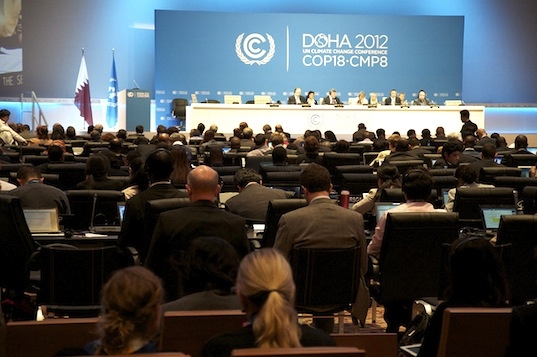Half way through the first week of the major climate talks of the year a number of worrying fault lines have emerged which have the potential to derail the Doha negotiations if they are not resolved, NGO experts warned.
Oxfam International’s Tim Gore said despite economic problems facing many rich countries here were many options still available to them to fund climate action, such as a Financial Transactions Tax (due to be implemented in 12 EU countries next year) or a fair carbon change on the emissions from international aviation and shipping.
“Failure to do this by next week, could see this COP start to unravel,” Gore said.
Mohamed Adow, from Christian Aid, said at this early stage of the talks countries were already adopting unhelpful negotiation tactics around the successful closure of the long-term cooperative action (LCA) track which came out of Bali in 2007 where finance was a key issue.
The LCA chair has drafted a text to move towards implementation. Because the countries do not agree, the text presents options and offers compromises on the resolution of key issues.
“Instead of working in good faith on this text, in the middle of the first negotiating week, we have already seen the Umbrella Group and the EU expressing strong concerns,” Adow said. “At this late stage of the LCA working group’s life, these are extremely unhelpful tactics.” In failing to work on this text, all these countries are doing is undermining their own strategy.
On Tuesday, the opening plenary of the Ad Hoc Working Group on Long-term Cooperative Action (AWG-LCA), saw parties divided over how to treat the informal overview text produced by its Chair, Aysar Tayeb.
The AWG-LCA is tasked to reach an agreed outcome under the Bali Action Plan (BAP). Tayeb had prepared an informal overview text (referred to as Conference Room Paper 3 or CRP3) for the Doha session, which he said was to “facilitate discussions among Parties on the different ideas and proposals presented”.
While many developing countries and their groupings welcomed the text as a basis for negotiations, developed countries including the Umbrella Group (Canada, Japan, Kazakhstan, New Zealand, Norway, Russia Federation and United States), the European Union, Switzerland and Mexico expressed objections to the text, not wanting it to have any basis for further discussions.
Tayeb, in his opening remarks said that the Conference of Parties (COP) in Durban had set the objective clearly of the working group to successfully finish its work and reach an agreed outcome, which will be forwarded to COP 18. He said that work began this year with a comprehensive evaluation of the issues under the BAP and good progress has been made which highlighted the achievements and the remaining work to be to be completed.
On the organization of work, Tayeb said that this session of the working group was a resumed session and work will proceed under a single contact group. There will be informal open-ended consultations on issues and there will be a stocktaking session to have an overview for feedback and interactions. Algeria, speaking for G77 and
China recognized that important progress has been made in the negotiations of this working group over the past years and wanted an outcome that is comprehensive and balanced.
The European Union in reference to the Chair’s overview text said that it was surprised by it and that it did not provide good basis for agreement.
The text, it said was not balanced and does not priorities tasks mandated by the Durban outcome.
The Peninsula
30 November
























































